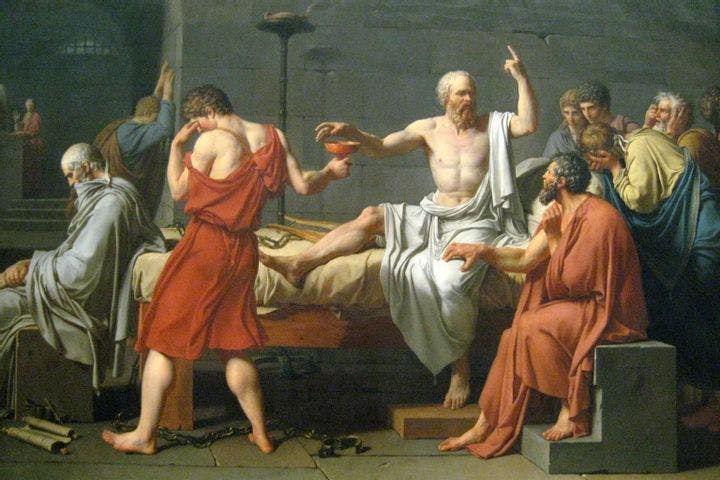Spring 2011
The Life and Times of Socrates
– F. S. Naiden
Those seeking an introduction to Socrates will find that Plati still has custody of him, and that Xenophon is still trying to liberate him from a politically controversial entourage.
Like Doctor Johnson, Socrates had a Boswell—Plato. That was not the only disadvantage under which Socrates had to labor. Imagine our having Boswell’s Life of Johnson (1791) without any of Samuel Johnson’s works. Then imagine not one but two Boswells. In Socrates’ case, the second was Xenophon, the Athenian soldier and author who wrote two dialogues in which Socrates figures as the chief speaker.
Into this quandary Bettany Hughes inserts The Hemlock Cup, a new biography of Socrates. Hughes tries to ignore Plato and Xenophon, and write a Life and Times. She has good reason for this evasive maneuver. Socrates was put to death after being convicted by an Athenian court on a charge of impiety and “corrupting the youth,” and this episode in the philosopher’s life invites an explanation that takes in all the circumstances surrounding this most famous of ancient Greek trials—the attitudes of the jurors; the way of life in Athens, an early democracy; the man-made environment and its influence on public business. The death of Socrates, an event that the painter Jacques-Louis David portrayed on a narrow scale, demands a grand scale.
Hughes has read widely, if conventionally, in recent scholarly literature, and so she provides up-to-date chapters or digressions on Athenian religion, the fifth-century BC building program for the Acropolis, and the Peloponnesian War. Aristophanes is an important figure, thanks to his satire of Socrates in The Clouds, and so is Alcibiades, the Athenian general and admiral who was perhaps Socrates’ favorite pupil. Other early philosophers, notably the advocate of humanism and ethical relativism Protagoras, bump up against ordinary Athenians for whom we have scraps of epigraphical evidence, such as a man named Simon, who was perhaps the proprietor of a cobbler shop Socrates frequented. Hughes is at her best in describing the Athenian agora, where Socrates spent much of his time engaged in the conversations that Plato and Xenophon would rework. Good on Socrates’ social life, she is best on his social environs.
Alas, Plato and Xenophon keep getting in the way. The pathos of the death of Socrates derives from three Platonic dialogues, the Crito, Phaedo, and Apology. The best defense of Socrates (much better than the defense Plato says Socrates gave in court) appears in Xenophon’s works, which present Socrates as a practical man and a good citizen, not an atheist or a corrupter of youth. The difference between Plato’s pathos and Xenophon’s advocacy makes the conviction of Socrates problematic. Plato implies that Socrates died because of his own nobility, which the court resented. Xenophon implies that Socrates died because the court did not want or get the facts. Plato implies that Athens is degraded. Xenophon disagrees—the polis is only mistaken.
Hughes does not know whom to believe. She relates Athens’s errors during the Peloponnesian War, which ended in 404 BC, just five years before the trial of Socrates, yet she praises Athenian democracy without any of Xenophon’s reservations. Xenophon and Socrates both admired Sparta, and Xenophon lived there after being exiled from Athens, but Hughes is contemptuous of Sparta, and indifferent to other Greek city-states such as Argos and Thebes. Yet the career of Socrates suggests that some attention ought to be paid to Sparta and the others. So far as we can tell, the Athenian courts performed worse than the courts in other Greek cities. The trial of Socrates is far from the only illustration of this weakness. We know that the Athenian assembly dealt highhandedly with the city’s officials, a mistake to which Socrates objected. That response may have made him unpopular. We also know that Sparta’s assembly mostly avoided this sort of mistake. Did certain Athenian institutional weaknesses kill Socrates? Or did the spirit of Athenian democracy kill him? Hughes avoids these questions, preferring to write a dramatized Baedeker.
Readers who want an introduction to Socrates’ Athens will benefit from this book (and would have benefited more were it shorter). Those seeking an introduction to Socrates will find that Plato still has custody of him, and that Xenophon is still trying to liberate him, as any advocate would, from a politically controversial entourage.
* * *
Reviewed: "The Hemlock Cup: Socrates, Athens, and the Search for the Good Life" by Bettany Hughes, Knopf, 2011.
Photo courtesy of Flickr/Wally Gobetz
